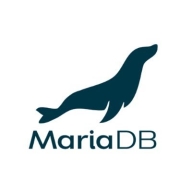

IBM Informix and MariaDB compete in database management solutions. MariaDB has the advantage due to its open-source model and active developer community, offering flexibility and cost-effectiveness.
Features: IBM Informix offers robust data replication, TimeSeries data management, and OLTP capabilities, catering to high-demand transactions and analytics. MariaDB provides an open-source framework with versatility, ease of customization, and strong support for varied deployments.
Room for Improvement: IBM Informix could benefit from simplifying its deployment process and further reducing upfront costs. Enhancing its community support could also be advantageous. MariaDB might improve by offering more structured customer support options and addressing high-transaction volume needs. Expanding its enterprise feature set could also enhance its value.
Ease of Deployment and Customer Service: MariaDB features a straightforward installation process compatible with numerous platforms, supported by a vibrant community and detailed documentation. IBM Informix, while offering structured customer support, has a more involved deployment reflecting its tailored enterprise-grade offerings.
Pricing and ROI: IBM Informix involves higher upfront costs due to its commercial license, yielding substantial ROI for businesses requiring specialized functions. MariaDB, with its open-source model, provides significant cost savings, enhancing ROI through reduced expenses and sustained performance.
| Product | Market Share (%) |
|---|---|
| MariaDB | 5.7% |
| IBM Informix | 1.9% |
| Other | 92.4% |


| Company Size | Count |
|---|---|
| Small Business | 9 |
| Midsize Enterprise | 2 |
| Large Enterprise | 8 |
| Company Size | Count |
|---|---|
| Small Business | 27 |
| Midsize Enterprise | 12 |
| Large Enterprise | 25 |
IBM Informix is a widely used and scalable relational database management system designed to handle large amounts of data and high transaction volumes. It is known to provide exceptional performance, thanks to its Parallel Data Query Engine (PDQ) that enables parallel processing of queries and operations, significantly reducing response times for complex queries and large data sets. Additionally, Informix supports online operations like backup, restore, index maintenance, and table reorganization, minimizing downtime and ensuring continuous availability.
Informix provides robust high availability and replication features, including shared-disk clustering, remote data replication, and high-availability data replication (HDR). These features ensure data redundancy, failover protection, and disaster recovery capabilities, making it a reliable choice for mission-critical applications. Furthermore, Informix offers specialized features for data warehousing and analytics, such as in-database analytics, data compression, and parallel load capabilities, making it suitable for business intelligence (BI) and data analysis applications.
Informix can be deployed as an embedded database, allowing it to be tightly integrated with applications and systems, reducing overhead and simplifying deployment. It includes workload management capabilities, enabling organizations to prioritize and manage different types of workloads, such as online transaction processing (OLTP) and analytical queries, ensuring efficient resource utilization and meeting service-level agreements (SLAs). Informix also provides robust security features, including role-based access control, data encryption, auditing, and compliance with industry standards like FIPS 140-2 and Common Criteria.
MariaDB is an open source relational database created by the original founders of MySQL. It is considered one of the most popular and trusted database servers throughout the world. MariaDB is a valued component found in most cloud offerings and is the default in many Linux tools. It is also widely used by Wikipedia, WordPress, and Google, among other well-known sites. Maria DB easily melds data into concise information from a vast array of applications, such as banking, online shopping, websites, and more.
MariaDB was originally created to improve MySQL performance. It is the most widely chosen database server due to the solution being super fast, robust, user-friendly, and easily scalable. MariaDB also offers a substantial ecosystem of plugins, storage engines, and numerous other valuable tools that make it very attractive for a significant offering of use cases.
The solution’s newest functionalities include compatibility with Oracle Database and Temporal Data Tables, and advanced clustering with Galera Cluster 4, which make it easier for users to research data history from any point in the past. Additionally, the most recent versions include JSON and GIS features. MariaDB is committed to staying an open source solution.
MariaDB Features
Reviews from Real Users
Faustine C., Engineering Supervisor- Corporate Data Solutions and Services at TZ Telecoms Corporation, shares, “The software provides a lot of information on what is happening inside the database. For most performance parameters it is easy to know if something is not right in the configuration or optimization which helps engineers take remedial fine-tuning measures. For example, if the database is underperforming it is easy to know which performance parameter can be adjusted to handle the workload. It is difficult to troubleshoot database issues if many performance parameters can not be monitored or debugged which is the case with some database management systems. It provides great monitoring of data storage, processing, and performance stability which is really important for real-time data storage and processing. It's a user-friendly product.”
A PeerSpot user who is a Senior Engineer at a tech services company relates, “ The solution's high availability is its most valuable aspect. We have found the product to be stable and the initial setup is pretty simple. I'd rate the solution at a ten out of ten. I'm very happy with it overall. I would recommend the solution to others. It's easy to find details about the product online and to learn about it.”
We monitor all Relational Databases Tools reviews to prevent fraudulent reviews and keep review quality high. We do not post reviews by company employees or direct competitors. We validate each review for authenticity via cross-reference with LinkedIn, and personal follow-up with the reviewer when necessary.